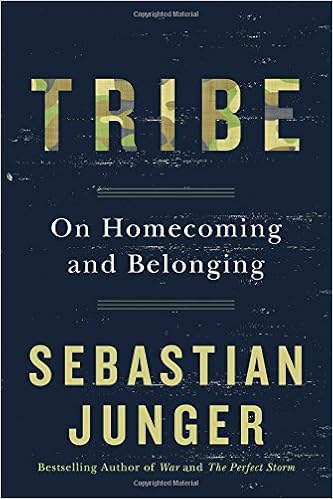Tribe, On Homecoming and Belonging, by Sebastian Junger

War reporter Sebastian Junger points out that primitive Native American societies had simple and clear passages to manhood. There were rehearsals for the extremities of war, and rituals for assisting warriors reentry into society after combat. American society, stratified widely by income and wealth, and divided in several ways by race, lacks the cohesion of tribal groups that valued sacrifice for the sake of the group, practiced rituals that healed, and allowed freedom of expression and relationship in egalitarian social systems based on interdependency rather than on self-interest.

One thread that runs through the book begins with a recollection of how, from early pre-colonizing years, a trickle of European settlers abandoned their civilized lives in the new world and escaped to the woods with Native American tribes. The reverse almost never happened. Members of the tribe depended on each other for survival. Personal freedom was offered, and responsibility to the group was expected. Today, the wildness and accountability of native tribes in battle is recalled in sports teams that bear names of Redskins, Warriors, Scouts and Chiefs.
Another thread running through Junger’s essay is an insistence that human beings have evolved to live together in community and to help one another, even in sacrificial ways. American society thwarts both of these basic instincts.
First agriculture and then industry, changed two fundamental things about the human experience…the accumulation of personal property allowed people to make more and more individualistic choices….diminishing group efforts toward a common good…and people found themselves living alone….A person living in a modern city can go through an entire day or an entire life mostly encountering strangers. They can be surrounded by others and yet feel deeply, dangerously alone….Rather than buffering people from clinical depression, increased wealth seems to foster it… p. 18 ff
Today’s veterans come home to find that although they are willing to die for their country, they’re not sure how to live for it. It’s hard to know how to live for a country that regularly tears itself apart along every possible ethnic and demographic boundary…In combat, soldiers all but ignore differences of race, religion, and politics within their platoon. It’s no wonder many of them get so depressed when they come home. p. 125
Acting in a tribal way simply means being willing to make a substantive sacrifice for your community–be that your neighborhood, your workplace, or your entire country. p. 131




It’s a strange world.
LikeLike